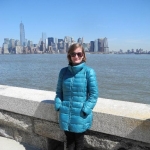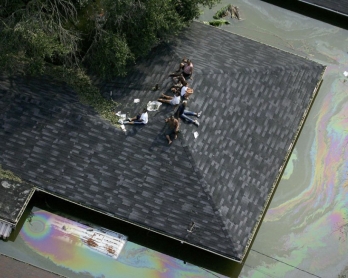When a hurricane comes barreling down
Winnie, Texas, US -- It was when the water rushed around my ankles that I knew I was in trouble.
I'd driven into a ditch overflowing with flood waters and couldn’t reverse. Rain lashed the windscreen, running down in rivulets blurring my view.
I tried to open the door. It was stuck.
“F-ck!”
Minutes earlier, I had headed out of my foodless hotel. Starving, I was planning to grab a bite at a restaurant 350 yards away and then head out again, to see how the weather was progressing in what was supposed to be the aftermath of Hurricane Harvey. Except that it wasn’t so much an aftermath as a continuation of the worst natural disaster to hit Texas in years. And now instead of bearing witness, I had fallen foul of the storm that dumped record rainfall on the Lone Star state’s eastern coast, triggering massive flooding.
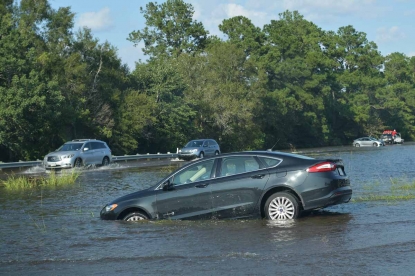 (AFP / Mandel Ngan)
(AFP / Mandel Ngan)I flipped open the lock, then wondered whether yanking the door was going to send a river of water surging into the car. But as water pooled around my ankles, I realised there was no other choice.
I heaved the door open, grabbed my bag, swung my legs out into the cold, murky, swilling flood waters and struggled to stand.
The swell of water tugged at black patent Birkenstocks (perhaps not the best flood attire but four years on a posting in New York leave their mark). I stomped furiously on the uneven surface and swore.
“Oh my God. Oh my God. Oh my God.”
Texas might be near tropical in summer but the water was cold. My trousers clung to my legs. The water was almost at my waist as I slipped and stumbled on the edge of the ditch onto higher ground.
Behind me, the white headlights of an enormous truck flashed through the rain.
Help. Thank God.
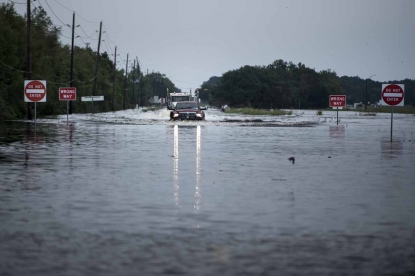 Crosby, Texas, August, 2017.
(AFP / Brendan Smialowski)
Crosby, Texas, August, 2017.
(AFP / Brendan Smialowski)In seconds, a swarthy Texan in overalls and waders grabbed my elbow and steered me to the back of his truck.
Shaking and in shock, for a minute I couldn't haul myself up into the back seat.
Panic set in. I thought of the indignity of him having to shove me in by the backside.
But Texans are far too polite to rear end an English woman travelling alone. On second attempt I hauled myself up and collapsed onto the seat.
“What about the car,” I wailed.
Wordlessly, he grabbed a tow and waded back out to the stranded vehicle. In a flash, it was out the ditch and deposited in the parking lot of the restaurant, where I had intended to be tucking into a steaming bowl of gumbo right about now.
"Did you leave anything in the car ma'am?"
My suitcase. Shit.
I clambered back out into the rain, flung open the back door of the car and grabbed the little pink wheelie from behind the driver's seat. Water flooded out of it, movie-style. Without a murmur, my savior swung it into his truck, drove me 30 seconds to my hotel and dropped me off.
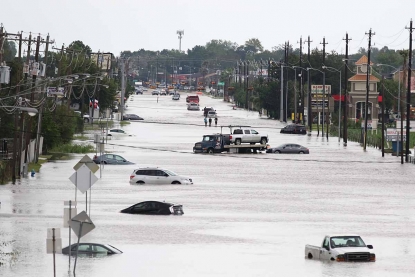 Houston, Texas, August, 2017.
(AFP / Thomas B. Shea)
Houston, Texas, August, 2017.
(AFP / Thomas B. Shea)“Thank you, thank you,” I repeated over and over again.
'What about the car?' I shouted.
“It's dead,” shot back the swarthy Texan.
So five minutes after I had headed out into Harvey, I sloshed back into the lobby of the two-star Comfort Inn in Winnie, a farming community of little more than 3,000 people, spraying filthy water all over neatly mopped tiles.
Fellow guests barely noticed. They were either blank with boredom at being trapped in the middle of nowhere because the interstate was a river -- or stricken with anguish after hazardous escapes from homes disappearing under water. Yet another sodden guest stomping in from outside was commonplace.
Even when I sprinted downstairs wrapped only in a towel and carrying my sopping clothes, no one batted an eyelid, just pointed me in the direction of the washing machine down the hall.
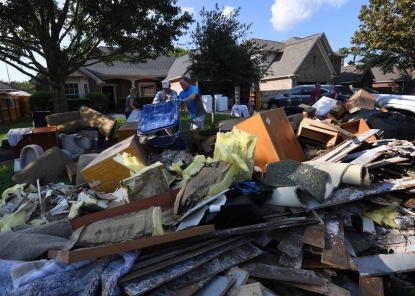 Twin Oaks Estate, Texas, August, 2017.
(AFP / Mark Ralston)
Twin Oaks Estate, Texas, August, 2017.
(AFP / Mark Ralston)Hurricane Harvey was not my worst mission for AFP. Not by a long stretch. And Texas is paradise compared to places I've driven in Sudan, Pakistan, Iraq or rebel-held northern Syria. When I embarked Sunday night on what was supposed to be a straightforward five-hour drive from New Orleans into Houston, I remembered an Afghan friend telling me how easy it was to drive in America compared to back home.
But nothing prepared me for quite how heavily it rained.
I never made it to Houston.
That first night I stopped in Beaumont, 85 miles to the east. It was pitch black and rain slammed against the window. In the morning, a man at breakfast cautioned me not to go out. “If you were my daughter I wouldn't let you,” he said.
Forty miles later, law enforcement diverted all cars off the interstate. It was too flooded to continue, they said. So I spent the day in the countryside riding with medics with waves lapping against the ambulance steps on a highway-come-lake. I joined a family of four floating down the freeway in a boat to rescue a Mom and her four children from a rapidly flooding house. At one point the rain was so heavy that I couldn't hear the playback from interviews I had recorded.
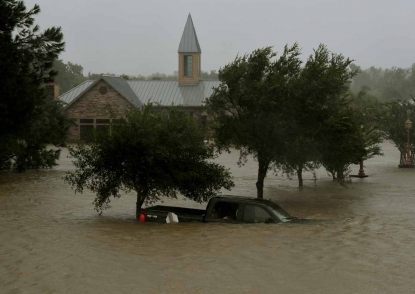 (AFP / Mark Ralston)
(AFP / Mark Ralston)By the time I'd filed my story, the rain was torrential. Police told me it was impossible to travel west. Go back, they advised. Winnie was the first place I got to. I got perhaps the last hotel room in town.
“You have hurricanes in your country?” was the question I got just about everywhere in Texas.
“No” was the answer, of course. The closest I got to one was last year, when I and two colleagues spent days hurtling from Virginia to Georgia in search of Hurricane Matthew, mostly finding ourselves in the wrong place at the wrong time, and braving out the worst at a hotel cheese and wine party.
It's not like I wasn't warned. At the Red Cross shelter in Winnie the 74-year-old manager told me the storm was barrelling our way next. As I drove home at 10 pm lightning streaked the sky.
The rain didn't stop all night.
In the morning, I tried to check out, determined again to make it to Houston. “Are you sure?” asked the receptionist. “Yours is the last room and if you leave you won't be able to come back.” I re-booked as an insurance policy, fully expecting to make it out of Winnie to somewhere more interesting.
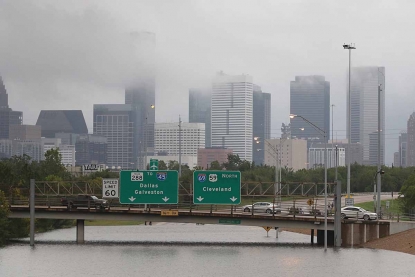 Downtown Houston, August 27, 2017.
(AFP / Thomas B. Shea)
Downtown Houston, August 27, 2017.
(AFP / Thomas B. Shea)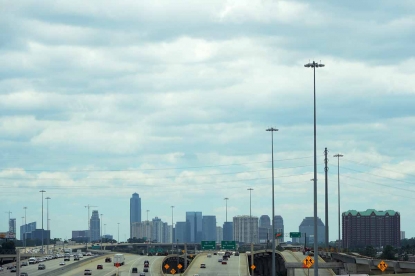 Houston, August 30, 2017.
(AFP / Mandel Ngan)
Houston, August 30, 2017.
(AFP / Mandel Ngan)
But the highway was closed. Water flooded the main drag. Everywhere I ventured, trucks in front of me stopped and turned back. I did the same.
I spent the morning in the hotel, trying and failing to interview Mexican migrant evacuees -- they didn't speak English and I don't speak Spanish. Once that avenue was exhausted, I wanted to see if the rain was letting up.
Except it wasn't. It was a one-minute drive to the only decent restaurant in Winnie. It was a risk, but I was starving. My mistake was to turn left too quickly, driving straight into the ditch obscured by the flood water rather than over the elevated lane into the parking lot.
Getting into that mess was easy. Getting out was not.
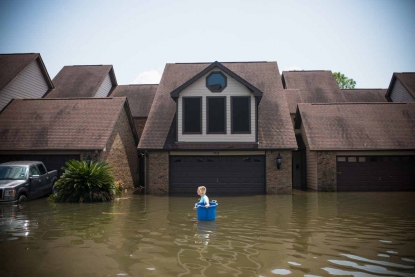 Port Arthur, Texas, September, 2017.
(AFP / Emily Kask)
Port Arthur, Texas, September, 2017.
(AFP / Emily Kask)Phone reception was abysmal. I couldn't connect properly to AFP, to the car rental firm, to mechanics, to taxi companies. When I finally made contact with roadside assistance, they told me they couldn't recover the car for days, battling a huge backlog with so many others flooded out and that there were no replacement vehicles for miles.
“Your best bet is an Uber or a taxi,” advised one woman at the call center.
Except there's no Uber in Winnie. Nor any taxi firms. Only a couple of gas stations, fast-food dives, some churches, a care home and a high school that was now a Red Cross shelter.
Even if there had been a car, there was no way out.
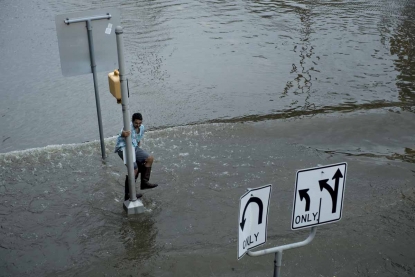 Houston, Texas, August, 2017.
(AFP / Brendan Smialowski)
Houston, Texas, August, 2017.
(AFP / Brendan Smialowski)That night, the wind howled and lightning tore through the sky. Water dripped through the air conditioning unit in my room. I stuffed towels along the window sill and on the floor. In the morning they were sodden and the carpet was wet. The power went off overnight. Breakfast was a donut.
I was stranded in Winnie for three days. No way in, no way out. Even when the sun evaporated most of the water on the main drag, the highways were still flooded. The closest taxi firms were in Beaumont, where the hospital was evacuating and homes were under water.
"We are still not moving and may be shutting down," wrote one firm in an email. "We are trying to survive at this time."
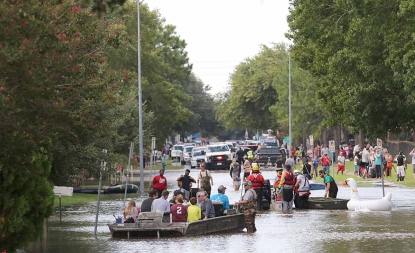 Houston, Texas, August, 2017.
(AFP / Thomas B. Shea)
Houston, Texas, August, 2017.
(AFP / Thomas B. Shea)It was a reminder that my defunct car was at worst an inconvenience. It was incredibly frustrating to be on a big assignment and unable to do anything other than wade up to my knees through flood waters to interview rescuers and evacuees at a gas station about the kindness of strangers.
But in a natural disaster that left some 60 people feared dead, clocked up tens of billions of dollars worth of damage and left tens of thousands without homes, escaping from a flooded car was nothing.
On the fourth day Arbin, a 60-year-old Trump-supporting, terrorist-hating, North Korea-fearing taxi driver finally made it through and drove me to Dallas, the nearest airport that could guarantee me a quick flight out. Driving north, Arbin picked his way gingerly through flooded country roads. His boss called repeatedly to check on us. But long detours, Arbin's need for cigarette breaks and sheer distance meant it took 7.5 hours to reach Dallas. There were no flight tickets left. So it was another night in Texas.
At least this time the hotel had room service.
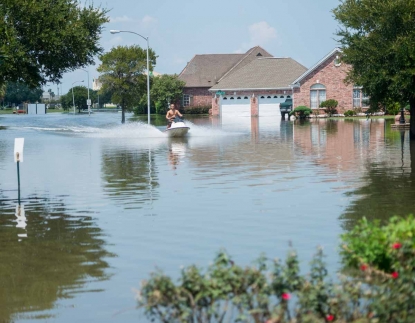 Port Arthur, Texas, September, 2017.
(AFP / Emily Kask)
Port Arthur, Texas, September, 2017.
(AFP / Emily Kask)


